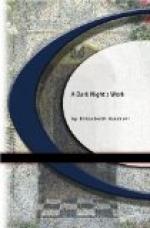had gone down again to his study, and almost at the
same moment she heard the little private outer door
of that room open; some one went out, and then there
were hurried footsteps along the shrubbery-path.
She thought, of course, that it was Mr. Dunster leaving
the house; and went back for Mr. Livingstone’s
letter. Having found it, she passed through her
father’s room to the private staircase, thinking
that if she went by the more regular way, she would
have run the risk of disturbing Miss Monro, and perhaps
of being questioned in the morning. Even in
passing down this remote staircase, she trod softly
for fear of being overheard. When she entered
the room, the full light of the candles dazzled her
for an instant, coming out of the darkness.
They were flaring wildly in the draught that came in
through the open door, by which the outer air was admitted;
for a moment there seemed no one in the room, and
then she saw, with strange sick horror, the legs of
some one lying on the carpet behind the table.
As if compelled, even while she shrank from doing
it, she went round to see who it was that lay there,
so still and motionless as never to stir at her sudden
coming. It was Mr. Dunster; his head propped
on chair-cushions, his eyes open, staring, distended.
There was a strong smell of brandy and hartshorn
in the room; a smell so powerful as not to be neutralized
by the free current of night air that blew through
the two open doors. Ellinor could not have told
whether it was reason or instinct that made her act
as she did during this awful night. In thinking
of it afterwards, with shuddering avoidance of the
haunting memory that would come and overshadow her
during many, many years of her life, she grew to believe
that the powerful smell of the spilt brandy absolutely
intoxicated her—an unconscious Rechabite
in practice. But something gave her a presence
of mind and a courage not her own. And though
she learnt to think afterwards that she had acted
unwisely, if not wrongly and wickedly, yet she marvelled,
in recalling that time, how she could have then behaved
as she did. First of all she lifted herself up
from her fascinated gaze at the dead man, and went
to the staircase door, by which she had entered the
study, and shut it softly. Then she went back—looked
again; took the brandy-bottle, and knelt down, and
tried to pour some into the mouth; but this she found
she could not do. Then she wetted her handkerchief
with the spirit, and moistened the lips; all to no
purpose; for, as I have said before, the man was dead—killed
by rupture of a vessel of the brain; how occasioned
I must tell by-and-by. Of course, all Ellinor’s
little cares and efforts produced no effect; her father
had tried them before—vain endeavours all,
to bring back the precious breath of life! The
poor girl could not bear the look of those open eyes,
and softly, tenderly, tried to close them, although
unconscious that in so doing she was rendering the
pious offices of some beloved hand to a dead man.




